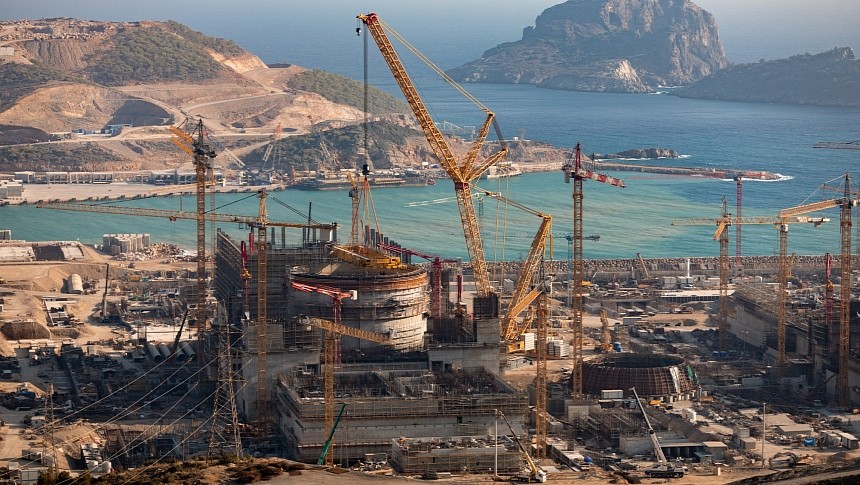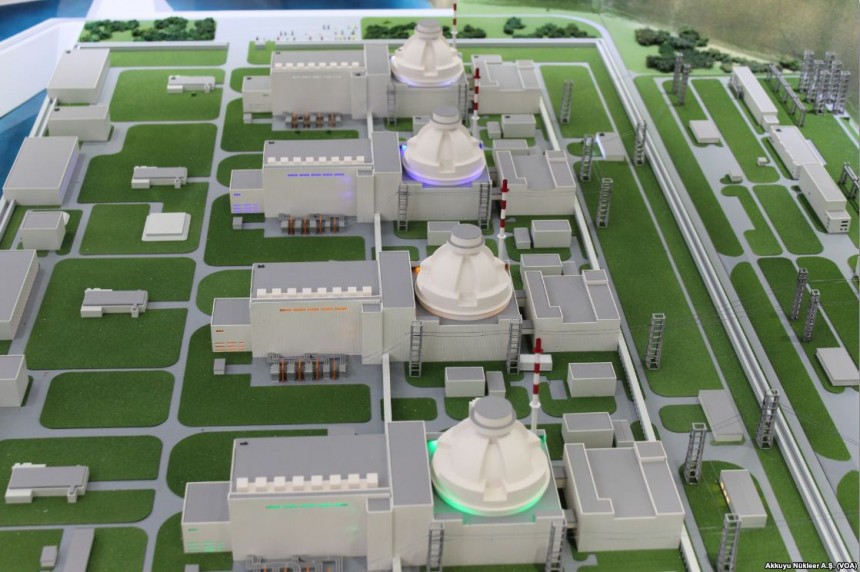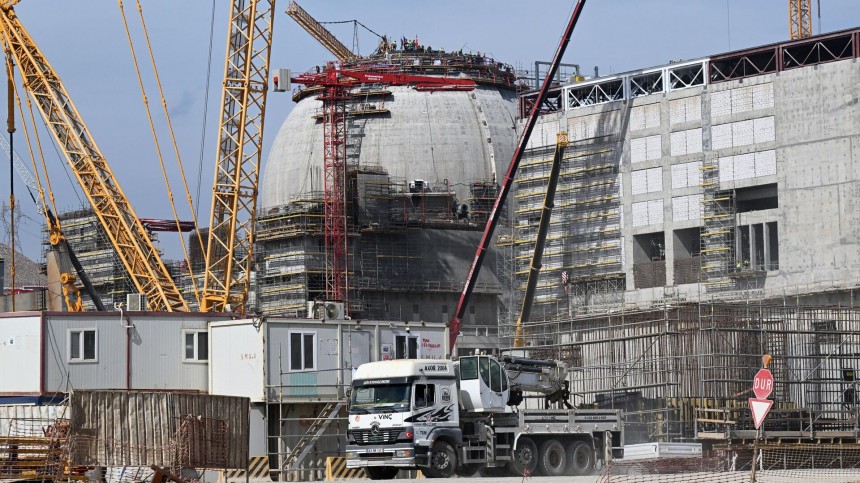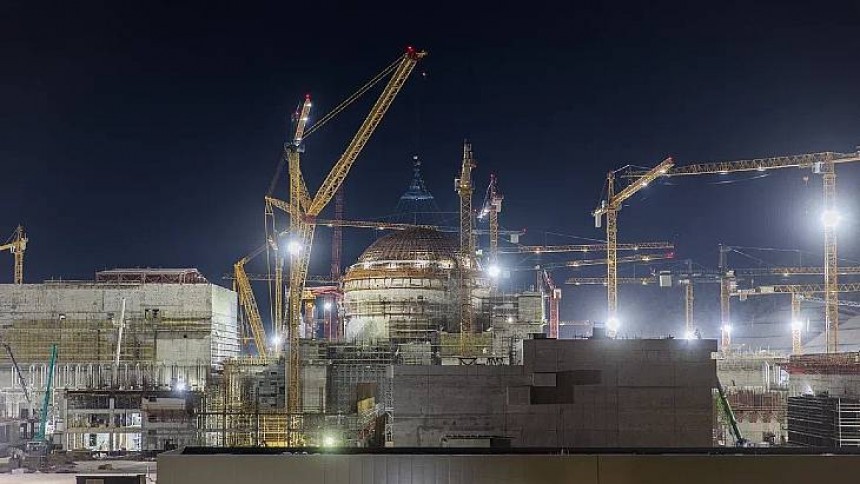By virtue of being geopolitically located at the gateway between Europe and Asia, Turkey can take advantage of certain national conditions that other nations can't. For instance, Turkey manages to be one of NATO's founding members and even host their Allied Land Command while entrusting the Government of the Russian Federation to help revitalize their national energy grid.
The story of the Akkuyu Nuclear Power Plant (ANPP), the first of its kind on Turkish soil, is one rooted in the world before the ongoing Russian invasion of Ukraine. A world in which the Kremlin still maintained a vested interest in courting lucrative business relationships with NATO-aligned countries and operated its foreign policy accordingly. A considerable level of correspondence between Russian President Vladimir Putin and Turkish President Recep Tayyip Erdogan has been instrumental to the ANPP since the project's announcement in 2010.
Located on the shores of the Mediterranean Sea in the Turkish Mersin Province, the first fission reactor complex at this novel facility just received its first batch of uranium fuel in anticipation of being brought online. But as Erdogan and Putin personally inaugurated the county's flagship energy project via video, it's hard not to be reminded of the tumultuous events unfolding in the project's periphery.
But rest assured. There are plenty of exciting things to discuss about the Akkuyu Nuclear Plant that aren't at all related to geopolitical chess-play. Strictly from a technological and energy perspective, the ANPP stands to be the cream of the crop. For some historical context, it's not like Turkey is a complete stranger to the awesome power of atomic energy. Their first strictly research-oriented reactor at the Çekmece Nuclear Research and Training Center in Istanbul achieved its first criticality in January 1962. Dubbed the TR-1, it was inaugurated in May of that year with then-president Cemal Gürsel presiding.
Of course, Turkey would conclude the year 1962 by playing a pivotal role in the Cuban missile crisis, on the grounds of hosting American nuclear ballistic missiles on its soil. By 1976, the town of Büyükeceli was already being scouted as a potential future sight of a commercial-grade fission reactor thanks to its proximity to the cooling waters of the Mediterranean. The decades-long struggle to secure a construction contract for the site could only be achieved when the Turkish Government inked a deal with the Russian state-owned Rosatom Corporation of Moscow.
It was decided that four Russian VVER-class pressurized-water reactors (PWRs) would be manufactured for use at the Akkuyu facility. Unlike typical boiling-water reactors (BWRs), which simply pump distilled water through a graphite-moderated fissile core, PWR reactor vessels pressurized to many times that of ambient Earth pressures prevent water from turning into steam until it's pumped into an unpressurized steam chamber. Here, captured steam is directed towards massive turbines which convert thermal energy into useable electricity.
Like an airliner undergoing catastrophic decompression at 35,000 feet, the resulting pressure delta makes for a far more ferocious release of thermal energy than through boiling water alone. In the case of Akkuyu, this should translate into roughly 1114 MW of useable electricity generated per reactor. This is roughly on par with some of Europe's other atomic titans, like Finland's Olkiluoto Nuclear Power Plant, home to the most powerful singular nuclear reactor on the continent.
With no less than four reactor complexes scheduled to go online by 2026, it should speak for itself how much of a game changer a world-class nuclear fission power station of this nature could be for Turkey, especially largely coal-based energy grid. After the agreement between Russia and Turkey was signed to construct the Akkuyu plant, it took a further seven years and 11 months before the final design blueprints were finalized. Only in April 2018 that joint Russo-Turkish personnel begins construction of the site's first reactor facility after a formal ceremony.
The fabrication of Akkuyu's second reactor complex began alongside the first in June 2020. Despite deep ties to Russia, the project is not free from Western influence. In fact, the General Electric Steam Power company of Schenectady, New York, was instrumental in sourcing four steam turbines for the Akkyu Nuclear Power Plant. GE's Arabelle-series steam turbines are manufactured at the company facility in Belfort, France, with the first shipped to Turkey for installation in January 2021.
Upon the first reactor's connection to the national grid, the Turkish Electricity Trade and Contract Corporation (TETAS) has agreed to purchase at least 70 percent of the electricity generated at Akkuyu. It's hoped that up to ten percent of Turkey's total electric GDP could be produced at the Akkuyu Nuclear Power Plant. In a domestic market where electric vehicle sales are predicted to jump almost 20 percent between 2023 and 2027, this extra power boost couldn't be coming at a more opportune time.
Of course, the eternal irony of the whole affair is this joint Turkish-Russian nuclear energy project will ultimately help Turkey break its dependence on foreign national gas. Natural gas also which also happens to be supplied in large part by Russia. But even without the wacky relationship between Turkey and Russia, the Akkyu Nuclear Plant finds ways to be controversial. No sooner did Turkey announce the genesis of its domestic commercial nuclear program did Germany put a disappointing bookend on its own civil nuclear energy program.
Less than two weeks separate the permanent decommissioning of Germany's final three remaining fission reactors and the inauguration of the facility at Akkyu. At a time when the global industrial complex needs to urgently decide the path towards totally carbon-free energy, the stark divide between nations who've taken pro-nuclear or anti-nuclear is leading to a strange duality in European countries especially. A paradigm in which whichever side of the atomic fence a nation-state adopts winds up becoming a point of national pride.
At least as far as Turkey is concerned, it appears working with a global pariah state might pay dividends by thrusting them into atomic power status. Whether they grow to regret their collaboration with Russia on its most important energy project in half a century is another can of worms entirely. But with most of the country still running on coal-fired power stations, perhaps Turkey doesn't have the luxury of picking who wants to work with them at the moment.
Only time will tell if history will look favorably on Turkey for even involving the Russians at all. But at least one thing's for sure. From a technological standpoint, there's no reason the Akkuyu Nuclear Plant can't be a landmark project for the historical middle-man between the East and the West.
Check back soon for more nuclear energy profiles and so much more right here on autoevolution.
Located on the shores of the Mediterranean Sea in the Turkish Mersin Province, the first fission reactor complex at this novel facility just received its first batch of uranium fuel in anticipation of being brought online. But as Erdogan and Putin personally inaugurated the county's flagship energy project via video, it's hard not to be reminded of the tumultuous events unfolding in the project's periphery.
But rest assured. There are plenty of exciting things to discuss about the Akkuyu Nuclear Plant that aren't at all related to geopolitical chess-play. Strictly from a technological and energy perspective, the ANPP stands to be the cream of the crop. For some historical context, it's not like Turkey is a complete stranger to the awesome power of atomic energy. Their first strictly research-oriented reactor at the Çekmece Nuclear Research and Training Center in Istanbul achieved its first criticality in January 1962. Dubbed the TR-1, it was inaugurated in May of that year with then-president Cemal Gürsel presiding.
Of course, Turkey would conclude the year 1962 by playing a pivotal role in the Cuban missile crisis, on the grounds of hosting American nuclear ballistic missiles on its soil. By 1976, the town of Büyükeceli was already being scouted as a potential future sight of a commercial-grade fission reactor thanks to its proximity to the cooling waters of the Mediterranean. The decades-long struggle to secure a construction contract for the site could only be achieved when the Turkish Government inked a deal with the Russian state-owned Rosatom Corporation of Moscow.
It was decided that four Russian VVER-class pressurized-water reactors (PWRs) would be manufactured for use at the Akkuyu facility. Unlike typical boiling-water reactors (BWRs), which simply pump distilled water through a graphite-moderated fissile core, PWR reactor vessels pressurized to many times that of ambient Earth pressures prevent water from turning into steam until it's pumped into an unpressurized steam chamber. Here, captured steam is directed towards massive turbines which convert thermal energy into useable electricity.
With no less than four reactor complexes scheduled to go online by 2026, it should speak for itself how much of a game changer a world-class nuclear fission power station of this nature could be for Turkey, especially largely coal-based energy grid. After the agreement between Russia and Turkey was signed to construct the Akkuyu plant, it took a further seven years and 11 months before the final design blueprints were finalized. Only in April 2018 that joint Russo-Turkish personnel begins construction of the site's first reactor facility after a formal ceremony.
The fabrication of Akkuyu's second reactor complex began alongside the first in June 2020. Despite deep ties to Russia, the project is not free from Western influence. In fact, the General Electric Steam Power company of Schenectady, New York, was instrumental in sourcing four steam turbines for the Akkyu Nuclear Power Plant. GE's Arabelle-series steam turbines are manufactured at the company facility in Belfort, France, with the first shipped to Turkey for installation in January 2021.
Upon the first reactor's connection to the national grid, the Turkish Electricity Trade and Contract Corporation (TETAS) has agreed to purchase at least 70 percent of the electricity generated at Akkuyu. It's hoped that up to ten percent of Turkey's total electric GDP could be produced at the Akkuyu Nuclear Power Plant. In a domestic market where electric vehicle sales are predicted to jump almost 20 percent between 2023 and 2027, this extra power boost couldn't be coming at a more opportune time.
Less than two weeks separate the permanent decommissioning of Germany's final three remaining fission reactors and the inauguration of the facility at Akkyu. At a time when the global industrial complex needs to urgently decide the path towards totally carbon-free energy, the stark divide between nations who've taken pro-nuclear or anti-nuclear is leading to a strange duality in European countries especially. A paradigm in which whichever side of the atomic fence a nation-state adopts winds up becoming a point of national pride.
At least as far as Turkey is concerned, it appears working with a global pariah state might pay dividends by thrusting them into atomic power status. Whether they grow to regret their collaboration with Russia on its most important energy project in half a century is another can of worms entirely. But with most of the country still running on coal-fired power stations, perhaps Turkey doesn't have the luxury of picking who wants to work with them at the moment.
Only time will tell if history will look favorably on Turkey for even involving the Russians at all. But at least one thing's for sure. From a technological standpoint, there's no reason the Akkuyu Nuclear Plant can't be a landmark project for the historical middle-man between the East and the West.














